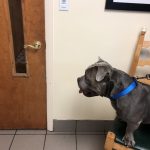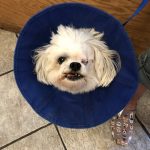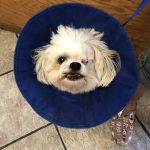Hello,
Based on your puppies age I have to urge you to go to the vet immediately. Any illness or disease in a puppy this young can be and should be regarded as an emergency. I worry about parvo, parasites and a slew of other things that can be dangerous and even deadly if not addressed quickly. Dehydration kills puppies. Quick. Please see a vet immediately.
Hello, a couple months ago my home became a multi-dog household, with the newest addition being a now 10 month old GS/lab mix, and our resident dog, a 3 year old beagle/rottie mix, both males. They are both very well behaved and have never fought. However, they were not socialized properly as puppies—or at least we did not adequately socialize our beagle mix when he was a puppy, and GS mix was already 6 months old when we got him and we don’t know if or how his previous owners socialized him.
The results of their poor socialization: resident dog does not seem to recognize playful behavior from new dog and thus becomes uncomfortable, clearly cares for new dog (acts to protect new dog if anyone is playing rough with him) but won’t play with new dog, and seems to sometimes even avoid new dog.
New dog is a little better with socialization, but his main fault is that it seems he doesn’t know how to recognize resident dog’s “corrections” to him and to back off (even if most of the time he simply wants to play with resident dog), and he also has some bullying tendencies, some intentional and others not (wants to play with whoever resident dog is playing with, sometimes bugs resident dog to move if new dog wants to lay down in that spot, etc; though never has shown any physical aggression).
Resident dog is, personally, my dog, and I love him dearly, though I love new dog too, and would love to see them bond and play together, only I don’t know the best course of action to achieve that.
I would greatly appreciate any help with ideas on how to adjust these behaviors of theirs, as well as weigh in on the idea of setting up a doggie-play-date with a friend (with a stable and model dog, of course) so that maybe visitor dog can teach them how they should behave.
Comments
Hello! I have a puppy named Chico, he’s a Japanese Spitz. He’s only 4 months old and he’s a really healthy dog. He eats a lot, he drinks a lot. However since 2 days ago, he hasn’t eaten anything. He doesn’t want to eat anything, he drinks water though. But he really doesn’t want to eat. Whenever we gave him food, after a few hours, he’ll vomit that food that he ate. We think it’s dehydration, but just like what, I’ve said awhile ago, he likes to drink a lot of water so I don’t think that he’s dehydrated. Since 2 days ago, he has lost around 4 pounds I think. We’ve tried giving him electrolyte like Gatorade, we’ve also given him metoclopramide, and dextrose also. But he always vomits his medicine after a few hours also. What should I do? Please help me, he’s really gloomy.
Comments
My dog has Melanoma cancer and he licks my lips and face is there any possible chance of me getting cancer too?
Hello, my 4 year old Staffordshire Terrier all of a sudden has become sick and we don’t know what is going on. He has suddenly started to cough which ends with him gagging. He doesn’t want to eat and just lays around sleeping. Occasionally, he will get the shivers. He has still been drinking water and will still go out to use the bathroom. I just hate seeing my little ball of energy looking so tired and miserable. I’m wondering if it’s kennel cough that has progressed or something of the sort. Anyone have any opinions or ideas of what it could be or what I can do to help him? We have very limited income right now.
Comments
I need help. My westie is almost 13 and she’s been suffering with recurring UTI’s for a little while now. She also has a bad ear infection. She’s tired. And i can’t stand to see her hurting anymore. I need help and advice on when euthanasia should come into the question. I’ve never done this before and i need all the help and second opinions i can get. this is my baby and i can’t watch her suffer. i also don’t want to put her down if she still has any value of life left. please help. please
Comments
I have a 1 year old female Staffordshire Terrier that my wife and I were considering turning into my service dog. After talking, her and I thought maybe we could get another dog and train one or both of them. As staffies being a bull breed member–thus she is somewhat dog aggresive–are there any breeds out there that would be compatible with a staffie?
Comments
Comments
Good morning pawbly friends. Apologies for the long question. I feel like the worst dog mom in the world right now? We recently rescued a beautiful black gsd- Riva the Diva. We have acreage, so while we do leash train, we also collar train (we cannot afford to fence in although we do have a small fenced section). We use the collar when we do our long walks around the perimeter or when we are playing in the yard, etc. we haven’t even started training Riva on it yet… I’ve only been putting it on her in the morning (“let’s get dressed” and taking it off in the evening “time for bed”) for the last three days. Yesterday afternoon I noticed she seemed uncomfortable and when I went to check her, her neck where the bulky part of the collar is was all raw! We haven’t even turned the collar on yet. I could easily fit 2 fingers width under the collar. Obviously I took the collar off right away and cleaned off the raw area. She slept completely collarless, and is without any type of collar at the moment. I’m only putting her regular collar on for short walks. This morning she is much happier and her neck looks much better already. My concern is what happened… was the collar too tight even though I could fit my fingers? Is there an allergic reaction? My other concern is, we travel/vacation with our dogs to the mountains, woods etc. and depend on these collars. This has not ever happened with any of our other dogs.Any advice would be greatly appreciated.
Comments
-
Anonymous It definitely sounds like an allergic reaction to me – there’s nickle in the contacts on e-collars, and many dogs are allergic to the metal. I would leash train her until you can figure something else out (maybe contact the collar manufacturer and see if they have an option for you?). Long line training is a good idea, too.
-
Anonymous Hey Sarah, is your system an electronic fence, or do you use a collar with a remote? If the latter, it looks like at least one company makes hypoallergenic contacts: https://leerburg.com/EducatorHypoallergenic.htm













Hello,
Is everyone spayed or neutered? Have you seen your vet about any of this? Can you reach out to a local trainer for help? I would start with these and remember exercise and training are super important for all cases of behavioral problems. I hope this helps. Please keep us posted